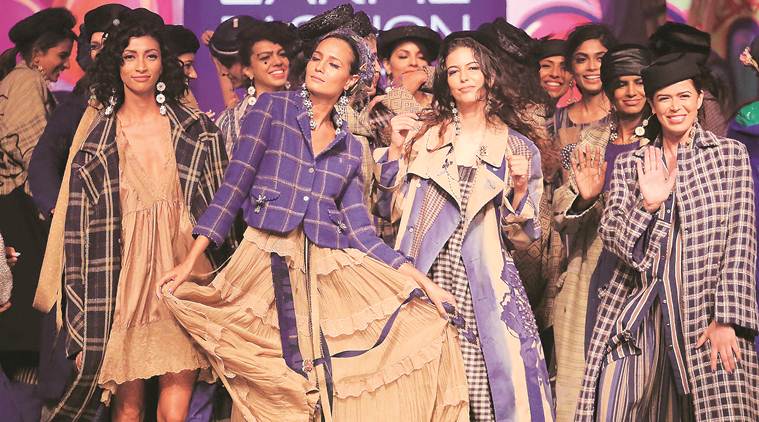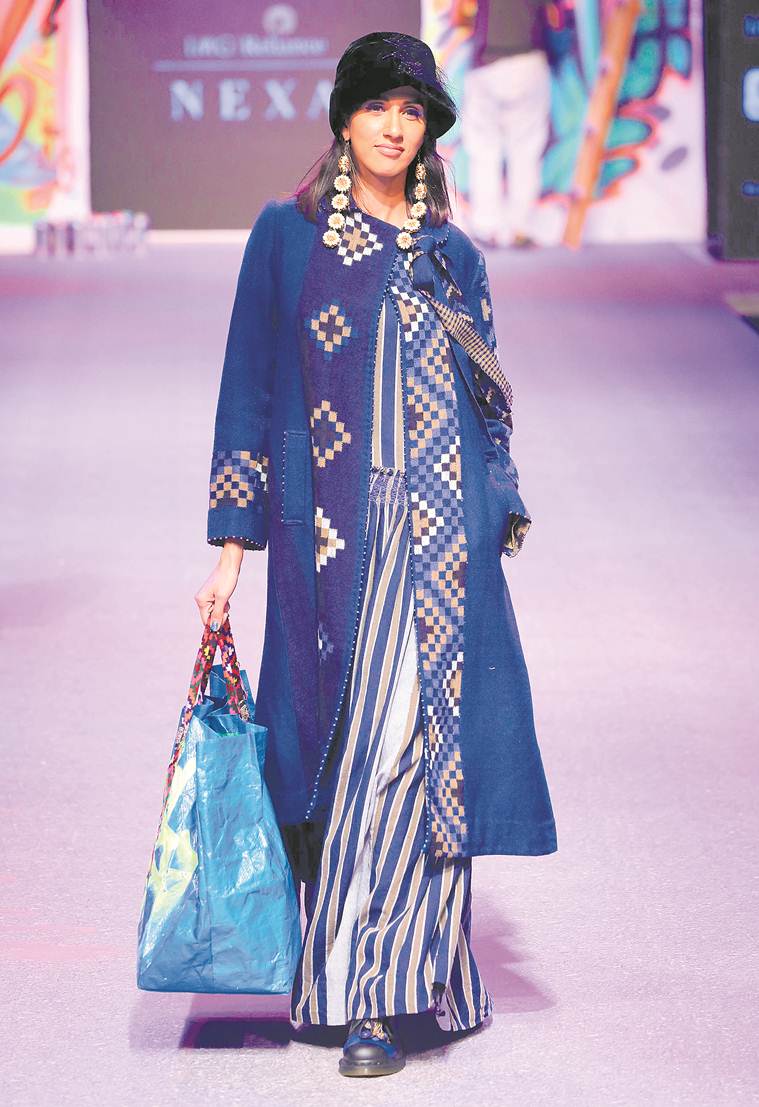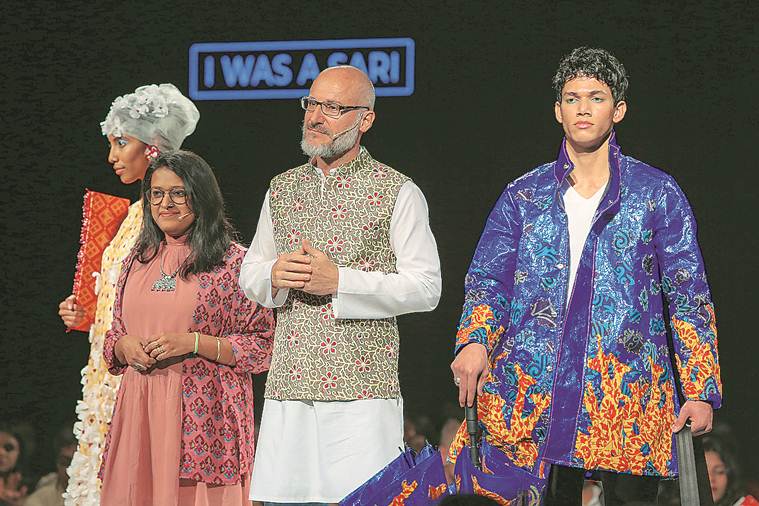
WHEN THE humble tarpaulin goes from rain cover to runway trend du jour, you know the sustainability conversation is gaining traction in Indian fashion circles. At Lakme Fashion Week (LFW) Summer-Resort 2019, the much-celebrated Sustainable Fashion Day last week saw two brands use the waterproof polyurethane-coated material in their collections and present an impressive window into their label’s engagement with recycling and eco-friendly processes. Aneeth Arora’s label Pero and Stephano Funari and Poornima Pande of I Was A Sari presented two disparate yet interesting schools of thought on the circular economy.
A WARM HEART
It’s very rare that you walk out of a Pero show without a smile on your face. For us, Aneeth Arora’s little big brand has become the embodiment of all that’s current and cool about Indian fashion. Ten years in the making and Pero has already won a Threads of Excellence Award presented by the Ministry of Textiles. But that’s not the only reason the National Institute of Design (Ahmedabad) graduate’s voice is a relevant one in Indian fashion. Soft-spoken and intensively focused, she has managed to create a narrative that traverses seamlessly between Indian and international fashionscapes. With a clear emphasis on the handmade, sustainable and syncretic, Pero’s brand blends the old and the new — “looking back to look forward” — for her unique take on fashion.
On Thursday evening, Arora showcased her Fall-Winter 2019 line at Lakme Fashion Week’s Summer-Resort 2019 edition, but no one in the audience was complaining. Presented in association with The Woolmark Company and Bhuttico, a 75-year-old wool weavers’ cooperative from Kullu, Himachal Pradesh, Arora’s show was all things Pero — warm (woollens, remember?) youthful and all heart. In a pre-show audio-visual clip, Arora spoke about narrating the journey of Merino wool from Australia to the handlooms of Himachal Pradesh. “People overseas have the notion that India is only good with spring textiles. So, we decided to push boundaries and look at traditional woollen textiles,” she says. The Pero team worked closely with the Kullu artisans, modernising their archival textiles known as Pattu, the shawls draped by local women. Recalibrated for a more contemporary take, the colour palette came in shades of blue, khaki, off-white and electric blue. Arora fashioned the rustic woollens into sassy separates with linen-cotton, stripes and checks from West Bengal, mashru stripes from Gujarat, hand-woven silks from Bhagalpur, mulberry silks from south India and chanderis from Madhya Pradesh. Her microcosmic mix of Indian weaves was elevated with pops of colour in the form of local Kullu tapes and borders known as “kushi”, traditionally woven on a miniature loom, which were used as ties and accents on clothes and accessories. Among the steady stream of checked smocks, jaunty jackets, embroidered and fringed pullovers, waffled sweaters, striped trousers and houndstooth jackets were some upcycled plastic tarpaulin trench coats, skirts and bags, imaginatively hand-painted and trimmed with kushi tapes.

Adding to the whole #MagicBallOfLove experience were live graffiti artists, skateboarders and a performance by hip hop and house dance crew, Kundu House Project, which kept the energy levels high. Arora says her brand follows the production practice where each piece passes from one craftsperson to the other in its journey to completion, thereby “creating products that have been touched by many hands”. In the process, Pero ends up touching many hearts, too.
THE SARI STORY
The much-awaited “Circular Design Challenge Awards 2019”, launched by LFW in collaboration with the UN Environment as part of R Elan’s “Fashion for Earth” initiative, was won by Stefano Funari and Poornima Pande of I Was A Sari. Picked from 900 entries from 30 cities, and eight finalists, the award has fetched I Was A Sari a cash prize of Rs 20 lakh and the opportunity to present a collection at LFW’s Winter-Festive 2019 edition.
The winning collection skilfully upcycled five materials like pre-loved saris, deadstock industrial jerseys, upcycled seatbelts, blue tarpaulin and waste beads to present quirky rainwear, bags, an umbrella, a 3D appliqued garment, a long logo T-shirt and footwear — all created in collaboration with NGOs that work with underprivileged women.
For Italy-born Funari (50), who founded I Was A Sari in 2013, it is the validation of a long-held dream. He was working with street children in Grant Road as part of the Community Outreach Programme (CORP) when he stumbled upon a godown full of preloved saris in Chor Bazaar. “Through my early work with CORP, I realised that nothing you do with children is sustainable unless you are able to support and empower the women behind them,” says Funari. “In order to be competitive in the market, to justify the premium of the product, we needed to have a specific aesthetic, tell a story and source material at an affordable price. At the Chor Bazaar godown I found my answer,” says Funari.

He partnered with CORP and the disadvantaged communities and drew upon the design skills of a research collective called Fashion in Process, from the Design Department of Politecnico di Milano University to get I Was A Sari on its feet. Today, the Wadala-headquartered collective employs over 90 trained women artisans who work with NGOs like CORP and Animedh Charitable Trust (ACT) from centres in Thane, Dharavi, Jogeshwari and Andheri. “The idea is to upcycle saris as well as upcycle lives of the women artisans that are working for us,” says marketing mastermind Pande (33).
Collaborations play a key role in their creative process. Their winning collections used tarps with upcycled sari patchwork created by New York-based artist Aubrey Roemer for her exhibition Tarpaulin Tapestries. “We also collaborated with eco-design company 959 and used their concept of using upcycled seatbelts to make accessories,” says Pande. The road ahead sees the collective create a runway collection in six months’ time. “It is a big challenge for us. We are not a brand, but a design collective. We know our constraints and limitations, but we work hard,” says Funari.